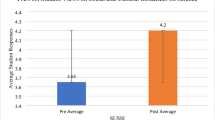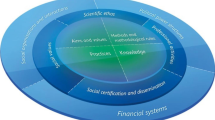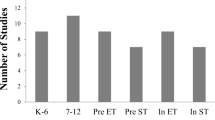Abstract
The study seeks to explore the extent to which students think pedagogical activities exemplifying various degrees of contextualization accurately reflect the work of scientists. Arguing for scaffolding across multiple degrees of contextualization, Clough (2006) reasoned that different contextualization plays different, but complimentary, roles in promoting conceptual change, and he suggested that decontextualized and moderately contextualized NOS activities may be dismissed by students as not representing authentic science. For this study, sixth-grade students (N = 137) engaged in three activities reflecting various levels of contextualization and responded to Likert and open-ended prompts asking them their perceptions about the relationship between the activity and real science. Students also ranked the activities from most to least like real science. Our findings demonstrate that participants most often described decontextualized and moderately contextualized activities as most representative of real science because participants perceived themselves to be acting like scientists. This study provides empirical support for Höttecke (2008) who, building on Clough (2006), proposed that both authentic contextualization and students’ actions in the classroom play roles in students’ perception of whether NOS teaching scenarios accurately represent authentic science. Given participants’ propensity to view highly contextualized NOS activities as less reflective of real science, this study illustrates the important role of the teacher in guiding student noticing during NOS activities. Challenging students’ narrow, action-oriented views of scientists appears to demand that teachers draw students’ attention to ways in which activities of all degrees of contextualization accurately and inaccurately represent NOS.


adapted from Hottecke (p. 9, 2008)
Similar content being viewed by others
References
Abd-El-Khalick, F. (2013). Teaching with and about nature of science, and science teacher knowledge domains. Science & Education, 22(9), 2087–2107
Abd-El-Khalick, F., Bell, R. L., & Lederman, N. G. (1998). The nature of science and instructional practice: Making the unnatural natural. Science Education, 82(4), 417–436
Abd-El-Khalick, F., & Lederman, N. G. (2000). Improving science teachers’ conceptions of nature of science: A critical review of the literature. International Journal of Science Education, 22(7), 665–701
Akerson, V. L., Abd-El-Khalick, F., & Lederman, N. G. (2000). Influence of a reflective explicit activity-based approach on elementary teachers’ conceptions of nature of science. Journal of Research in Science Teaching, 37(4), 295–317
Allchin, D. (2011). Evaluating knowledge of the nature of (whole) science. Science Education, 95(3), 518–542
Allchin, D., Andersen, H. M., & Nielsen, K. (2014). Complementary approaches to teaching nature of science: Integrating student inquiry, historical cases, and contemporary cases in classroom practice. Science Education, 98(3), 461–486
American Association for the Advancement of Science. (1989). Science for all Americans. Author.
Appleton, K. (1997). Analysis and description of students’ learning during science classes using a constructivist-based model. Journal of Research in Science Teaching, 34(3), 303–318
Bannerman, M. D. (2008). Continuum: Selecting inquiry-based experiences to promote a deeper understanding of the nature of science. Iowa Science Teachers Journal, 35(2), 10–14
Bell, R. L., Blair, L. M., Crawford, B. A., & Lederman, N. G. (2003). Just do it? Impact of a science apprenticeship program on high school students’ understandings of the nature of science and scientific inquiry. Journal of Research in Science Teaching, 40(5), 487–509
Bell, R. L., Lederman, N. G., & Abd-El-Khalick, F. (2000). Developing and acting upon one’s conception of the nature of science: A follow-up study. Journal of Research in Science Teaching, 37, 563–581
Bell, R. L., Matkins, J. J., & Gansneder, B. M. (2011). Impacts of contextual and explicit instruction on preservice elementary teachers’ understandings of the nature of science. Journal of Research in Science Teaching, 48(4), 414–436
Bell, R. L., Mulvey, B. K., & Maeng, J. L. (2012). Beyond understanding: Process skills as a context for nature of science instruction. In Advances in nature of science research (pp. 225–245). Springer.
Bell, R. L., Mulvey, B. K., & Maeng, J. L. (2016). Outcomes of nature of science instruction along a context continuum: Preservice secondary science teachers’ conceptions and instructional intentions. International Journal of Science Education, 38(3), 493–520
Bergman, D. J. (2018). “I Think You Mean…” Potential perils of teacher paraphrasing and alternative responses for student engagement. The Clearing House, 91(4–5), 201–211
Bransford, J. D., Brown, A. L., & Cocking, R. R. (2000). How people learn (Vol. 11). National Academy Press.
Capps, D. K., & Crawford, B. A. (2013). Inquiry-based instruction and teaching about nature of science: Are they happening? Journal of Science Teacher Education, 24(3), 497–526
Christidou, V. (2011). Interest, attitudes and images related to science: Combining students' voices with the voices of school science, Teachers, and Popular Science. International Journal of Environmental and Science Education, 6(2), 141–159.
Clough, M. P. (2006). Learners’ responses to the demands of conceptual change: Considerations for effective nature of science instruction. Science & Education, 15(5), 463–494
Clough, M. P. (2007). Teaching the nature of science to secondary and post-secondary students: Questions rather than tenets. In The pantaneto forum (Vol. 25, No. 1, pp. 31–40).
Clough, M. P. (2011a). The story behind the science: Bringing science and scientists to life in post-secondary science education. Science & Education, 20(7), 701–717
Clough, M. P. (2011b). Teaching and assessing the nature of science: How to effectively incorporate the nature of science in your classroom. The Science Teacher, 78(6), 56–60
Clough, M. P., Berg, C. A., & Olson, J. K. (2009). Promoting effective science teacher education and science teaching: A framework for teacher decision-making. International Journal of Science and Mathematics Education, 7(4), 821–847
Clough, M. P. (2020). Framing and teaching the nature of science as questions. Chapter 15 (pp. 271–282) in McComas (Ed.) Nature of science in science instruction: Rationales and strategies, Springer.
Darling-Hammond, L. (2000). Teacher quality and student achievement. Education Policy Analysis Archives, 8, 1
De Condorcet, N. (1785). Essai sur l’application de l’analyse à la probabilité des décisions rendues à la pluralité des voix. Paris.
El Takach, S., & Yacoubian, H. A.(2020). Science teachers’ and their students’ perceptions of science and scientists. International Journal of Education in Mathematics, Science and Technology, 8(1), 65–75.
Erduran, S., & Dagher, Z. R. (2014). Reconceptualizing nature of science for science education. In Reconceptualizing the nature of science for science education (pp. 1–18). Springer, Dordrecht.
Fralick, B., Kearn, J., Thompson, S., & Lyons, J. (2009). How middle schoolers draw engineers and scientists. Journal of Science Education and Technology, 18(1), 60–73
Galili, I. (2019). Towards a refined depiction of nature of science. Science & Education, 28(3), 503–537
Gandolfi, H. E. (2017). Teaching about nature of science in secondary education: A view from multicultural classrooms. School Science Review, 98(365), 77–84
García-Carmona, A., & Díaz, J. A. A. (2016). Learning about the nature of science using newspaper articles with scientific content. Science & Education, 25(5–6), 523–546
Herman, B. (2008). Are questions enough?: An action research investigation to analyze the effect of questions and non-verbal behaviors on student responses with suggestions for improving practice. Iowa Science Teachers Journal, 35(3), 12–16
Herman, B. C., Clough, M. P., & Olson, J. K. (2013). Association between experienced teachers’ NOS implementation and reform-based practices. Journal of Science Teacher Education, 24(7), 1077–1102
Herman, B. C. (2018). Students’ environmental NOS views, compassion, intent, and action: Impact of place-based socioscientific issues instruction. Journal of Research in Science Teaching, 55, 600–638.
Höttecke, D. (2008). Was ist Naturwissenschaft? Physikunterricht über die Natur der Naturwissenschaften [What does science mean? The nature of science in physics education]. Naturwissenschaften im Unterricht - Physik, 19(103), 4–11
Höttecke, D. (2013). A sketch of the problem of authentic inquiry-based learning from a history of science perspective. Paper presented at the 12th IHPST Conference, Pittsburgh, PA.
Irzik, G., & Nola, R. (2011). A family resemblance approach to the nature of science for science education. Science & Education, 20(7–8), 591–607
Karisan, D., & Zeidler, D. L. (2017). Contextualization of nature of science within the socioscientific issues framework: A review of research. International Journal of Education in Mathematics Science and Technology, 5(2), 139–152
Kent-Schneider, I., & Kruse, J. (2020). Using a Simple Pendulum Investigation to Develop Students’ History and Nature of Science Knowledge. The Physics Teacher, 58(9), 628–631.
Khishfe, R. (2019). The transfer of nature of science understandings: A question of similarity and familiarity of contexts. International Journal of Science Education, 41(9), 1159–1180
Khishfe, R., & Abd-El-Khalick, F. (2002). Influence of explicit and reflective versus implicit inquiry-oriented instruction on sixth graders’ views of nature of science. Journal of research in science teaching, 39(7), 551–578
Khishfe, R., & Lederman, N. (2006). Teaching nature of science within a controversial topic: Integrated versus nonintegrated. Journal of Research in Science Teaching, 43(4), 395–418
Kruse, J. (2008). NOS: Integrating the nature of science throughout the entire school year. Iowa Science Teachers Journal, 35(2), 15–20.
Kruse, J. (2010). Historical short stories in the post-secondary biology classroom: Investigation of instructor and student use and views. Unpublished doctoral dissertation.
Kruse, J. & Wilcox, J. (2011). Using historical science stories to illuminate nature of science ideas and reduce stereotypical views in a sixth grade classroom. Paper presented at the Association for Science Teacher Educators International Conference, Minneapolis, MN, January.
Kruse, J., Easter, J. M., Edgerly, H. S., Seebach, C., & Patel, N. (2017). The impact of a course on nature of science pedagogical views and rationales. Science & Education, 26(6), 613–636.
Kruse, J., Kent-Schneider, I., Voss, S., Zacharski, K., & Rockefeller, M. (2020). Investigating the effect of NOS question type on students’ NOS responses. Research in Science Education. https://doi.org/10.1007/s11165-020-09923-z.
Lederman, N., & Abd-El-Khalick, F. (1998). Avoiding de-natured science: Activities that promote understandings of the nature of science. In The nature of science in science education (pp. 83–126). Dordrecht: Springer.
Lederman, N. G., Abd-El-Khalick, F., & Smith, M. U. (2019). Teaching nature of scientific knowledge to Kindergarten through University students. Science & Education, 28(3), 197–203
Matthews, M. R. (1994). Science teaching: The contribution of history and philosophy of science. Routledge.
Matthews, M. R., Clough, M. P., & Ogilvie, C. (n.d. A). Pendulum motion: The value of idealization in science. https://storybehindthescience.org/pdf/pendulum.pdf. Accessed 28 Apr 2021.
Matthews, M. R., Clough, M. P., & Ogilvie, C. (n.d. B) The role of theory: Pendulum motion, time measurement, and the shape of the Earth. https://storybehindthescience.org/pdf/earthshape.pdf. Accessed 28 Apr 2021.
Matkins, J. J., & Bell, R. L. (2007). Awakening the scientist inside: Global climate change and the nature of science in an elementary science methods course. Journal of Science Teacher Education, 18(2), 137–163
National Research Council. (1996). National science education standards. Washington, DC: National Academies Press.
NGSS Lead States. 2013. Next generation science standards: For states, by states. Washington, DC: The National Academies Press.
Olson, J. K. (2008). Methods and strategies: The science representation continuum. Science and Children, 46(1), 52–55.
Paraskevopoulou, E., & Koliopoulos, D. (2011). Teaching the nature of science through the Millikan-Ehrenhaft dispute. Science & Education, 20(10), 943–960
Piliouras, P., Plakitsi, K., Seroglou, F., & Papantoniou, G. (2018). Teaching explicitly and reflecting on elements of nature of science: A discourse-focused professional development program with four fifth-grade teachers. Research in Science Education, 48(6), 1221–1246
Rockoff, J. E. (2004). The impact of individual teachers on student achievement: Evidence from panel data. American Economic Review, 94(2), 247–252
Rowe, M. B. (1986). Wait time: Slowing down may be a way of speeding up! Journal of teacher education, 37(1), 43–50
Rudge, D. W., Cassidy, D. P., Fulford, J. M., & Howe, E. M. (2014). Changes observed in views of nature of science during a historically based unit. Science & Education, 23(9), 1879–1909
Sadler, T. D., Chambers, F. W., & Zeidler, D. L. (2004). Student conceptualizations of the nature of science in response to a socioscientific issue. International Journal of Science Education, 26(4), 387–409.
Scharmann, L. C., Smith, M. U., James, M. C., & Jensen, M. (2005). Explicit reflective nature of science instruction: Evolution, intelligent design, and umbrellaology. Journal of Science Teacher Education, 16(1), 27–41
Schwartz, R. S., Lederman, N. G., & Crawford, B. A. (2004). Developing views of nature of science in an authentic context: An explicit approach to bridging the gap between nature of science and scientific inquiry. Science Education, 88(4), 610–645
Sinatra, G. M., Southerland, S. A., McConaughy, F., & Demastes, J. W. (2003). Intentions and beliefs in students' understanding and acceptance of biological evolution. Journal of Research in Science Teaching: The Official Journal of the National Association for Research in Science Teaching, 40(5), 510–528.
Solomon, J., Duveen, J., Scot, L., & McCarthy, S. (1992). Teaching about the nature of science through history: Action research in the classroom. Journal of Research in Science Teaching, 29(4), 409–421
Stronge, J. H., Ward, T. J., Tucker, P. D., & Hindman, J. L. (2007). What is the relationship between teacher quality and student achievement? An exploratory study. Journal of Personnel Evaluation in Education, 20(3), 165–184
Tala, S., & Vesterinen, V. M. (2015). Nature of science contextualized: Studying nature of science with scientists. Science & Education, 24(4), 435–457
Tao, P.-K. (2003). Eliciting and developing junior secondary students’ understanding of the nature of science through a peer collaboration instruction in science stories. International Journal of Science Education, 25, 147–171.
Taplin, R. H. (1997). The statistical analysis of preference data. Journal of the Royal Statistical Society: Series C (Applied Statistics), 46(4), 493–512
Voss, S., Kruse, J., and Kent-Schneider, I. (2020). Refining explicit-reflective questioning by examining responses to different NOS question types. Paper presented at the School Science and Mathematics Association Annual Conference. November.
Walker, K. A., & Zeidler, D. L. (2003). Students’ understanding of the nature of science and their reasoning on socioscientific issues: A web-based learning inquiry.
Williams, C. T., & Rudge, D. W. (2019). Effects of historical story telling on student understanding of nature of science. Science & Education, 28(9–10), 1105–1133
Author information
Authors and Affiliations
Corresponding authors
Ethics declarations
Conflict of interest
The author’s do not have any conflict of interest.
Additional information
Publisher's Note
Springer Nature remains neutral with regard to jurisdictional claims in published maps and institutional affiliations.
Rights and permissions
About this article
Cite this article
Kruse, J., Kent-Schneider, I., Voss, S. et al. Investigating Student Nature of Science Views as Reflections of Authentic Science. Sci & Educ 30, 1211–1231 (2021). https://doi.org/10.1007/s11191-021-00231-0
Accepted:
Published:
Issue Date:
DOI: https://doi.org/10.1007/s11191-021-00231-0




